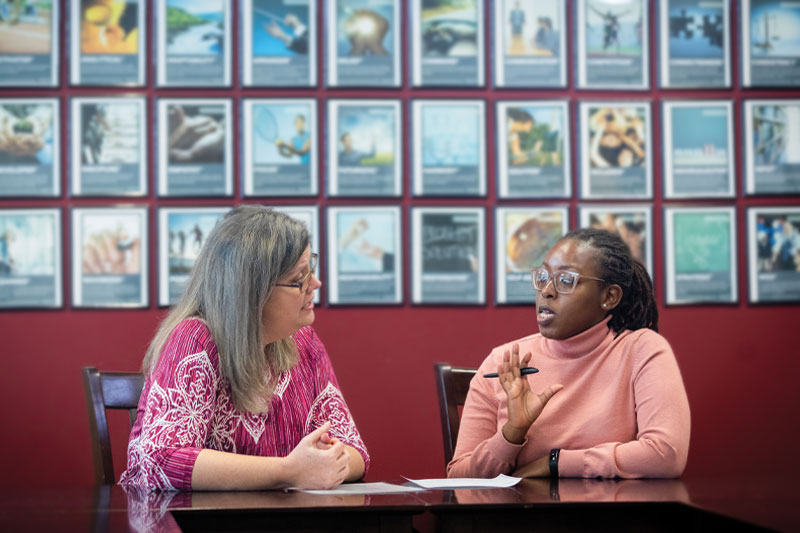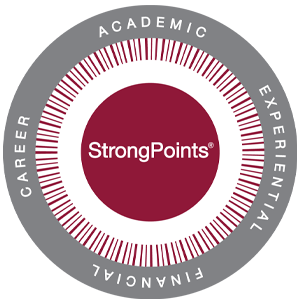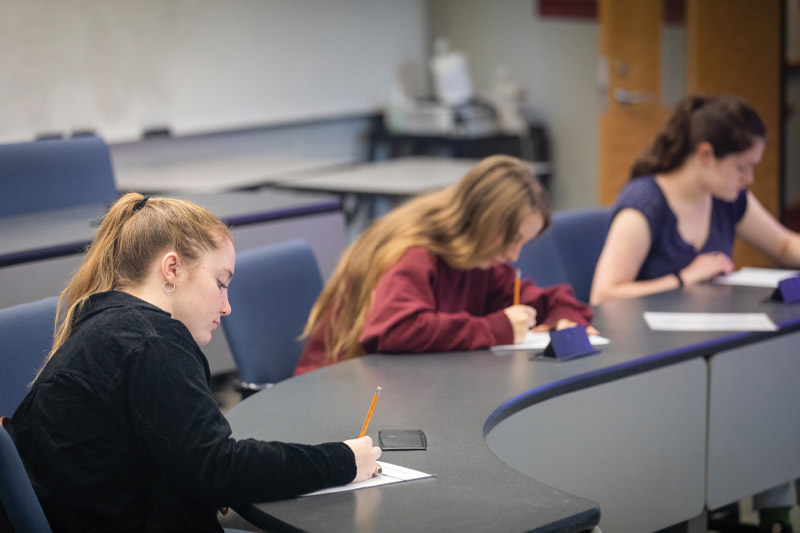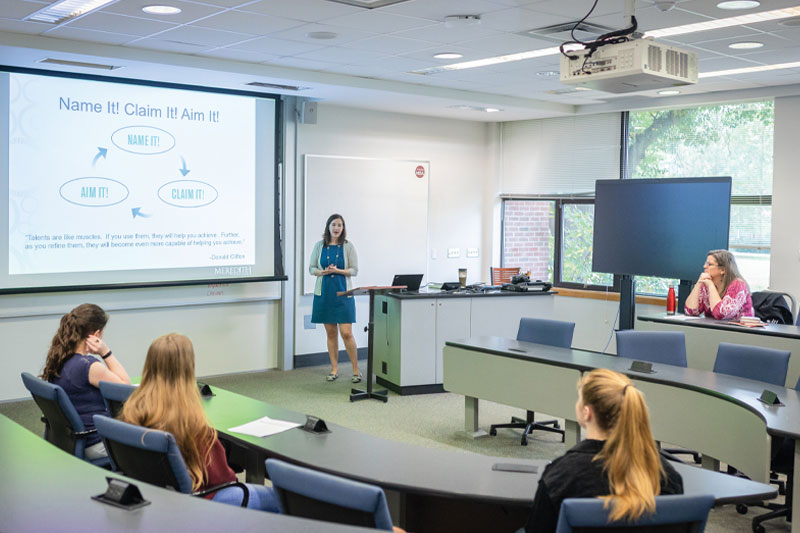
The Powerful, Personal Impact of StrongPoints®
How Strengths Coaching Helps Meredith Students Prepare for a Future of Purpose
By Gaye Hill
The Powerful, Personal Impact of StrongPoints®
How Strengths Coaching Helps Meredith Students Prepare for a Future of Purpose
By Gaye Hill
As Meredith’s signature personal advising and coaching initiative nears its tenth anniversary, the program is thriving. But that doesn’t mean it’s business as usual.
Since the program’s launch in 2014, the individualized nature of StrongPoints has been a cornerstone. According to StrongPoints director Beth Hwang,’13, that will be an even greater emphasis moving forward, particularly through one-on-one coaching sessions with Hwang and Emily Caldwell, assistant director of StrongPoints.
Both Hwang and Caldwell are Certified Strengths Coaches.
“Our students just don’t use this benefit enough,” said Hwang. “We can be impacting more people. So we’re trying to emphasize it, in part because of its value. Coaching by a certified strengths coach may cost upwards of $75 to $150 an hour – and our students have this available to them at no cost because it’s part of the StrongPoints program.”
Hwang said the more important reason they’re stressing individual strengths coaching is the impact they see it has on students’ growth.
“We interact with them in classrooms and workshops, but those are in the context of a group setting where there’s not as much time to dig deeper into what’s going on with them,” said Hwang. “Strengths coaching is a proactive approach. You can learn more about yourself or set a plan to reach your goals utilizing your strengths. The more you’re reflecting on who you are, the more you have to work with when you need to make a decision or address something.”
An emphasis on asking questions is one of the defining characteristics of coaching, with the goal of fully understanding the student and the situation. Coaches empower students to provide their own answers.
A typical challenge students bring to Caldwell is roommate issues. She helps students identify the specific concerns they’re having and how one or more of their strengths can help them work through those issues and build stronger relationships.
“They have everything inside of them to be successful,” said Caldwell. “We bring that out by asking questions and by helping them learn to use their strengths in a new way.”
“One of the biggest pieces for me is the confidence building we see in our students – understanding who they are and how they function. It can be difficult to talk about yourself. So it can be helpful to have this language based on an assessment that I would say is pretty darn accurate.”

FACTS
2014
The year StrongPoints launched at Meredith College
1949
The year research began that underpins CliftonStrengths, the assessment tool used to identify students’ strengths through StrongPoints
Four Elements of StrongPoints
ACADEMIC
EXPERIENTIAL
FINANCIAL
CAREER
Benefits of StrongPoints
According to Hwang and Caldwell, StrongPoints confers valuable, measurable benefits for students, as well as Meredith faculty and staff who do a strengths assessment as part of their onboarding process or ongoing professional development.
“One of the biggest pieces for me is the confidence building we see in our students – understanding who they are and how they function,” said Hwang. “It can be difficult to talk about yourself. So it can be helpful to have this language based on an assessment that I would say is pretty darn accurate.”
Caldwell agreed, noting it can be especially valuable for students to understand and be able to discuss their strengths when interviewing for a job.
“It’s really just giving words to students to be able to talk about themselves. Walking into an interview, a typical question is what are your strengths and weaknesses? This gives them that vocabulary.”
Hwang said the more important reason they’re stressing individual strengths coaching is the impact they see it has on students’ growth.
“We interact with them in classrooms and workshops, but those are in the context of a group setting where there’s not as much time to dig deeper into what’s going on with them,” said Hwang. “Strengths coaching is a proactive approach. You can learn more about yourself or set a plan to reach your goals utilizing your strengths. The more you’re reflecting on who you are, the more you have to work with when you need to make a decision or address something.”
An emphasis on asking questions is one of the defining characteristics of coaching, with the goal of fully understanding the student and the situation. Coaches empower students to provide their own answers.
A typical challenge students bring to Caldwell is roommate issues. She helps students identify the specific concerns they’re having and how one or more of their strengths can help them work through those issues and build stronger relationships.
“They have everything inside of them to be successful,” said Caldwell. “We bring that out by asking questions and by helping them learn to use their strengths in a new way.”
Increased Emphasis on Financial Literacy
Financial literacy has always been a key component of StrongPoints, with good reason given Meredith’s status as a women’s college.
According to a study from Credit Karma and Qualtrics, women are twice as likely as men to associate negative emotions with their finances, and women are five times more likely to live paycheck to paycheck than men. In fact, last year Hwang wrote an article for Inside Higher Ed titled “Every Woman Deserves a Financial Education.”
“As household breadwinners are increasingly female, it is important that women have the financial tools and resources that come with supporting a household, negotiating salaries, and building wealth,” said Hwang.
“They have everything inside of them to be successful. We bring that out by asking questions and by helping them learn to use their strengths in a new way.”
The financial element of StrongPoints provides a spectrum of lessons for students – everything from basic budgeting and negotiating compensation to more complex material such as how finances impact relationships, student loan repayment, and financial goal setting.
“Students don’t always know what they don’t know about finances, because it’s such a complicated topic, and they often don’t know they need to know it until they’ve encountered the situation. At that point they’re less proactive and more reactive,” said Hwang. “We hope to bring more of that proactive effort.”
Meredith recently launched a one-credit course that serves as an introduction to financial literacy topics. Financial workshops are held in November, and April is Financial Literacy Month, during which the StrongPoints team offers workshops, resources, and tips via email and social media. Also to come is a financial fair with banks and financial experts on hand to answer students’ questions.
In addition, Hwang and Caldwell recently became Certified Financial Education Instructors, with the intention of bringing that signature personalized approach to the financial literacy component of StrongPoints.
“What it really comes down to is helping individuals in their particular situation,” said Hwang. “Students connect the dots. So we’re not going to promote a budget workshop. We’re going to promote independent living or something that draws them in.”
Caldwell said she learned through her financial education curriculum that our financial behavior starts when we’re about 8 years old.
“Our behaviors normally mirror our family members and people we’re close to. So sometimes, if you don’t know financial information, it’s because what you know has surrounded you your whole life,” said Caldwell. “We’re trying to move beyond financial literacy. We’re really trying to push for financial well-being.”
BENEFITS OF STRENGTH COACHING TO STUDENTS
- Report having more control of their academic futures
- Are more likely to set learning goals and have a growth mindset
- Demonstrate increased levels of academic engagement, objective test scores, and quality of public speaking
- Showed increased self-confidence, direction, hope, and altruism
Source: Louis, 2008; Cantwell, 2008; Hodges & Clifton, 2002
PEOPLE WHO USE THEIR STRENGTHS ARE
- 6X as likely to be engaged in their job
- 6x as likely to strongly agree they have the chance to do what they do best every day
- 3x as likely to report having an excellent quality of life
Source: CliftonStrengths
Curious about your own top five strengths? You can take a strengths assessment test and access an array of resources on the CliftonStrengths website, including a directory of Certified Strengths Coaches. Learn more: gallup.com/cliftonstrengths



